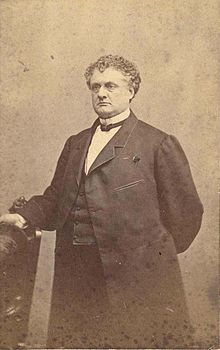 |
| Governor John A. Andrew of Massachusetts |
WAR DEPARTMENT, February 20, 1862.
Major General B. F. BUTLER, Boston, Mass.:
The following telegram was sent to Governor Andrew last night:
Your communication of the 18th instant has just been received. This Department recognizes the right of a Governor to commission volunteer officers. If General Butler assumes to control your appointment or interfere with it he will transcend his authority and be dealt with accordingly. The Adjutant-General has left the Department and gone to the country, but to-morrow he will transmit an order to General Butler that will prevent his improper interference with your legitimate authority.
EDWIN M. STANTON,
Secretary of War.
P. H. WATSON,
Assistant Secretary of War.
ADJUTANT-GENERAL'S OFFICE, Washington, February 20, 1862.
Major General B. F. BUTLER, U. S. Volunteers,
Boston, Mass.:
The Secretary of War directs that all vacancies of commissioned officers in all New England regiments shall be filled by the Governors. General Williams is attached to your command. Fourteenth Connecticut is not organized. Acknowledge by telegraph.
L. THOMAS,
Adjutant-General.
BOSTON, MASS., February 20, 1862.
Honorable E. M. STANTON,
Secretary of War:
General Butler has in no way attempted to interfere with the legitimate authority of Governor Andrew.
B. F. BUTLER,
Major-General.
Official Records, Series III., Vol. 1, Part 1, Page 897.
Butler was a controversial figure throughout his war service, even with the government. He was in Massachusetts recruiting for an expedition which ultimately would take New Orleans when he raised the ire of Massachusetts governor John A. Andrew. Andrew, like most governors, reserved the right to make appointments of officers to volunteer regiments raised in their states. He and Butler disagreed over his selections and in this Butler overplayed his hand. Andrew was a key figure in the Republican Party and a leading abolitionists, and regardless of his successes Butler did not have the political connections to take on a powerful opponent.
No comments:
Post a Comment